The Most Powerful One-Time Address Management Tool! Fluidkey Ensures On-Chain Payments No Longer Expose Your Identity
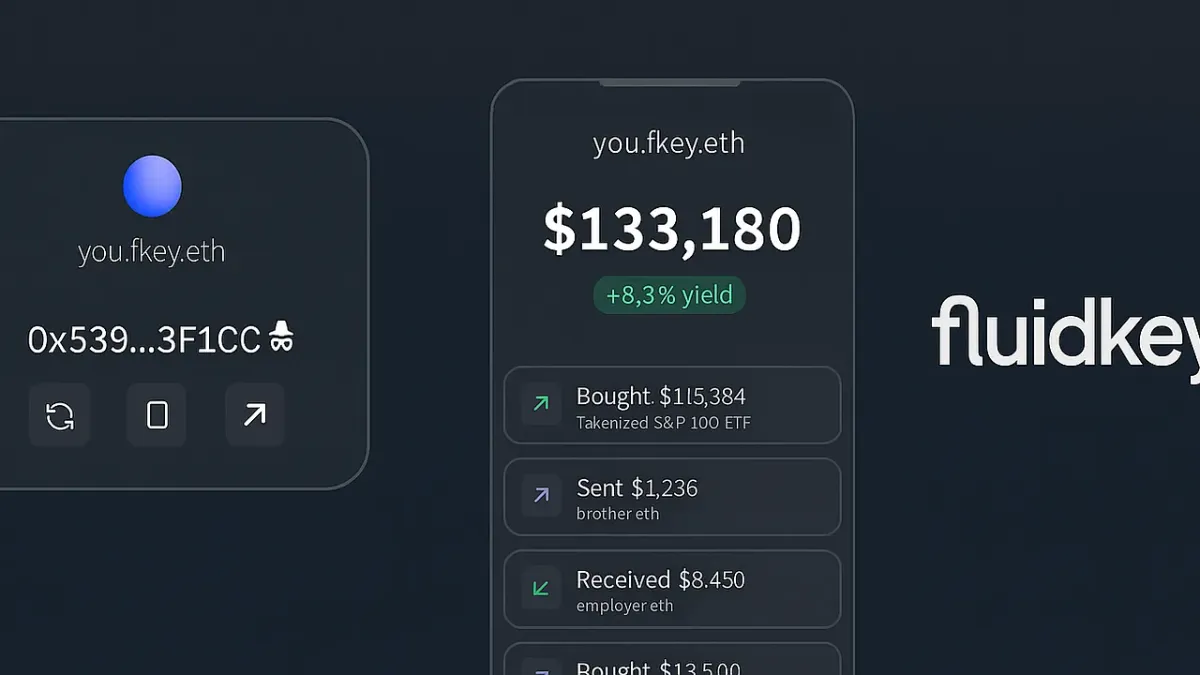
GM,
Let's start with a quick survey: How many sets of wallet addresses do you currently have?
POLL: How many sets of wallet addresses do you currently have?
- 5 sets or fewer
- 5 - 20 sets
- More than 20 sets
I'll admit, I'm one of those people with "more than 20 sets," and managing them is a real pain 😂. This article's main subject, Fluidkey, perfectly addresses my needs; it's a very practical on-chain privacy tool. Let's start with something everyone's familiar with: online shopping.
One-Time Numbers
Have you received any scam calls lately? In recent years, Taiwan's Ministry of Digital Affairs, in collaboration with e-commerce platforms, has been promoting "logistics privacy mask technology," which has significantly reduced the headache of personal data breaches.
Every time we shop online, we have to provide our name, phone number, and address. Once that data is given out, there's no telling who it might end up with. "Logistics privacy mask technology" converts the consumer's real phone number into a one-time code. Sellers and logistics personnel can still contact you as usual. Once the goods are delivered, this code becomes invalid.
This cuts off the risk of privacy leaks at the source. Even if an e-commerce platform or logistics provider is hacked, the hackers won't get their hands on your real data. The codes are like disposable chopsticks – used once and then discarded. This leaves scam groups with no way to act.
This same ingenious idea has also been applied by Apple to email. Apple's "Hide My Email," launched in 2021, is a prime example:
Hide My Email creates unique, random email addresses that automatically forward messages to your personal inbox... You can read and reply to messages as usual, and your real email address is kept private. Whether you’re signing up for an app, subscribing to a newsletter, using Apple Pay, or sending an email to someone you don’t know well, Hide My Email ensures your personal email is not revealed.
Email inboxes often get bombarded with "unsolicited" messages, with many people having "999+" unread emails for years. This Apple feature helps users create a unique email address for each website. This not only allows you to track which platform leaked your personal data but also enables you to disable that address with a single click, solving the problem at its root.
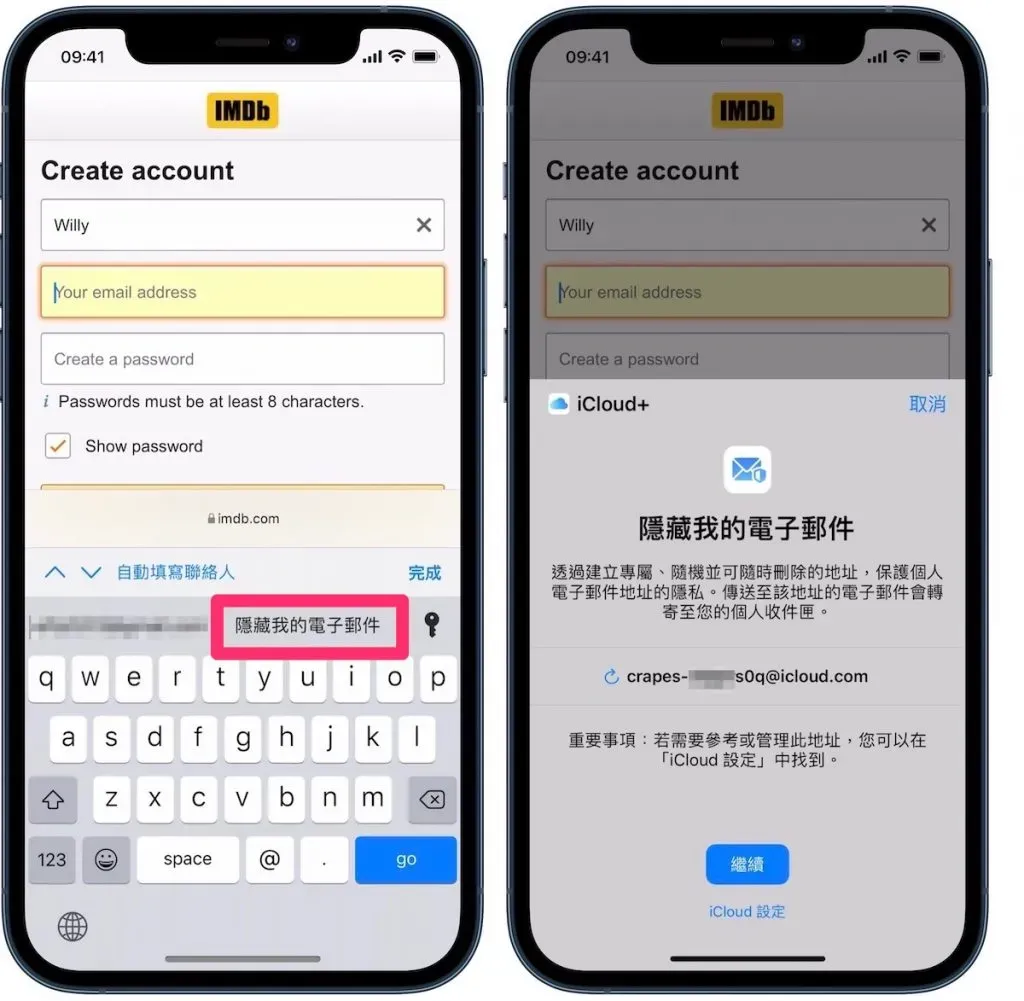
Any fixed contact information carries the risk of being leaked. This is even more true for wallet addresses.
With someone's wallet address, you can use a blockchain explorer to look up their balance and transaction history. It's like giving someone your phone number, only for them to be able to access your call records from the past decade—quite terrifying. This is the privacy issue that Fluidkey aims to solve.
The Most Powerful One-Time Address Management Tool
Blocktrend's long-time readers might know that my wallet address is mnhsu.eth. However, to protect my privacy, this is just one of my many wallets. I actually keep an Excel spreadsheet to record the purpose of each address and how its private key is stored. Otherwise, with so many addresses, I simply couldn't remember them all, and I might not even realize if one got lost. But ever since I discovered Fluidkey, pursuing privacy has become much easier.
Fluidkey isn't a wallet; you don't need to create a new one to use it directly. After connecting your existing wallet, Fluidkey will create a dedicated receiving page for you. For example, mine is mnhsu.fkey.id. Every time you open it, a brand new receiving address is automatically generated. You can try it yourself: refresh the page once, and the address changes. It looks like different wallets, but behind the scenes, they are all controlled by me alone.
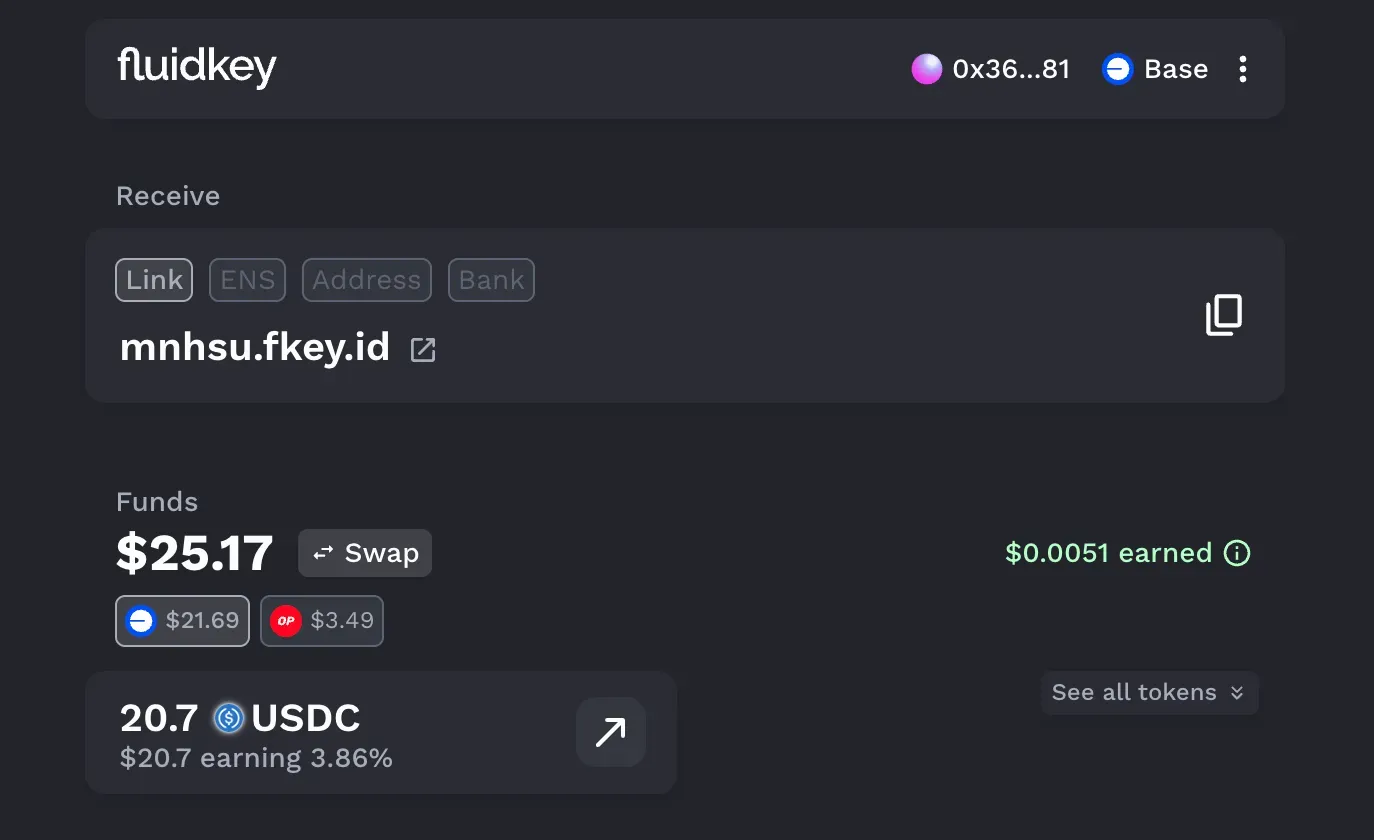
What's the purpose of this? Let's take Blocktrend's subscription fees as an example. Previously, anyone could check the receiving address and know how many people paid with cryptocurrency. But now, everyone receives a different address, and only I know the full scope of the financial flow.
Fluidkey's most impressive feature is its user experience. If 10 people each pay $700, the backend won't list 10 separate $700 transactions; instead, it automatically consolidates them into one $7,000 entry. If I later need to pay $800, Fluidkey will automatically draw from two wallets for me: one paying $700 and another paying $100.
It feels as if all the money is in a single wallet, and I don't need to manage those 10 individual addresses at all. Managing a large number of one-time addresses for users is Fluidkey's core function!
What amazes me even more is that Fluidkey has also integrated ENS. The image below shows the result of my Etherscan query for my ENS domain, mnhsu.fkey.eth; it corresponds to a 0x63d9... address. However, if you refresh the page, it resolves to a different address each time. This isn't a bug; it's Fluidkey's real-time calculation. While on the surface it appears to be different receiving addresses, all assets actually go into my pocket.
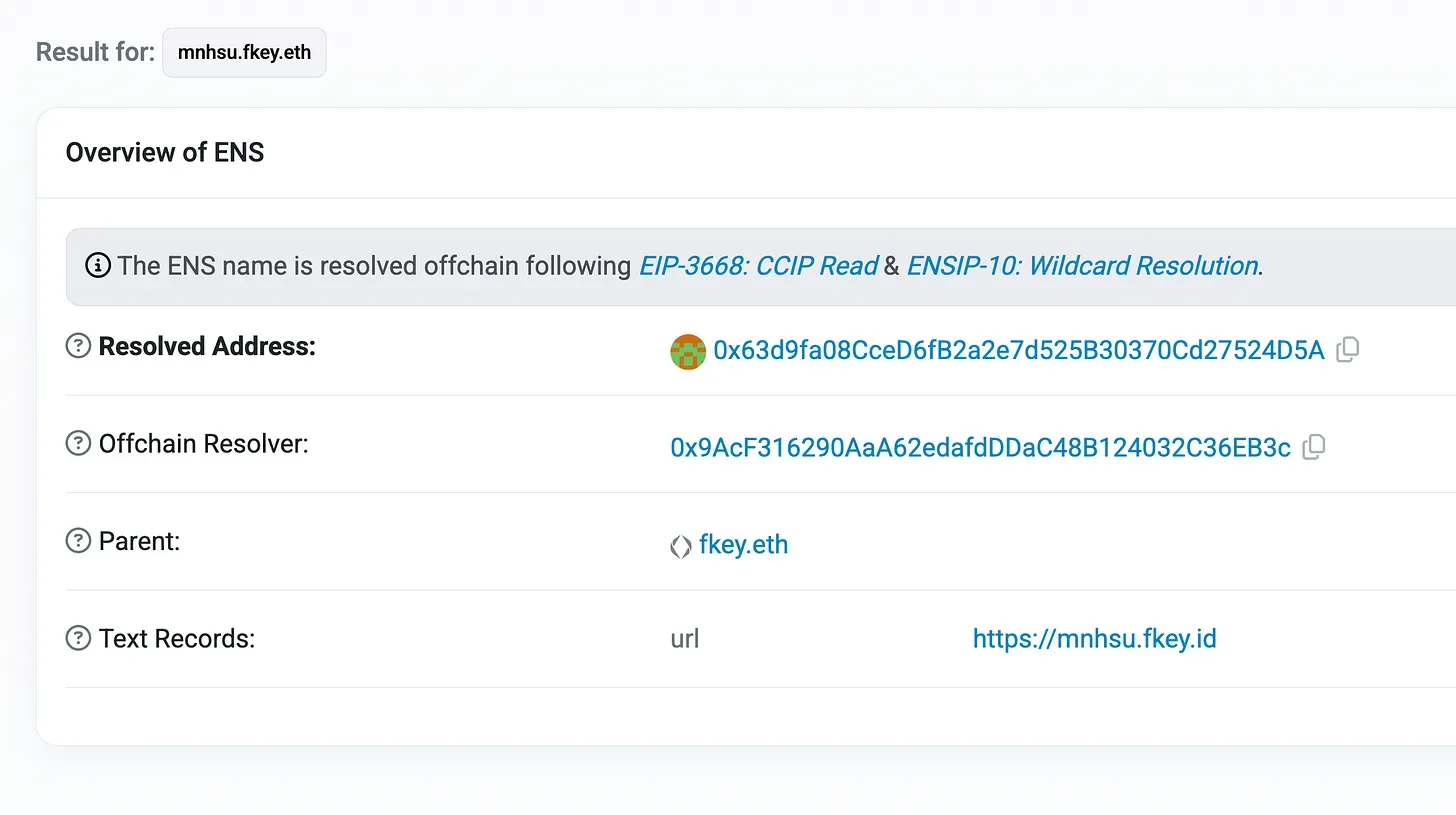
This goes a step further than "logistics privacy mask technology." The essence of logistics privacy masking is "forwarding": a one-time code wraps the real phone number, so while it's not visible on the surface, the same phone number is still used for sending and receiving.
Fluidkey's approach, however, is to apply for a brand new phone number every single time, and then consolidate messages from hundreds of these numbers onto the single phone you hold. While this method might seem "clumsy," it completely severs the connection between addresses. This is something humans can't do, but machines can achieve with ease. "Dynamically created, uniformly managed" is where Fluidkey truly shines.
The most incredible feature is yet to come! Fluidkey can not only receive cryptocurrency but also bank transfers in USD and EUR. Users just need to switch to the "Bank" tab and complete a one-time identity verification to get two dedicated bank accounts: one for USD and one for EUR. If your company pays salaries via bank transfer, you can simply provide this account number and receive USDC or EURC within Fluidkey. For the company, it's just a transfer to a certain account; they have no idea you've put your salary on-chain, and even if they did, it would be difficult to trace whose wallet is behind it.
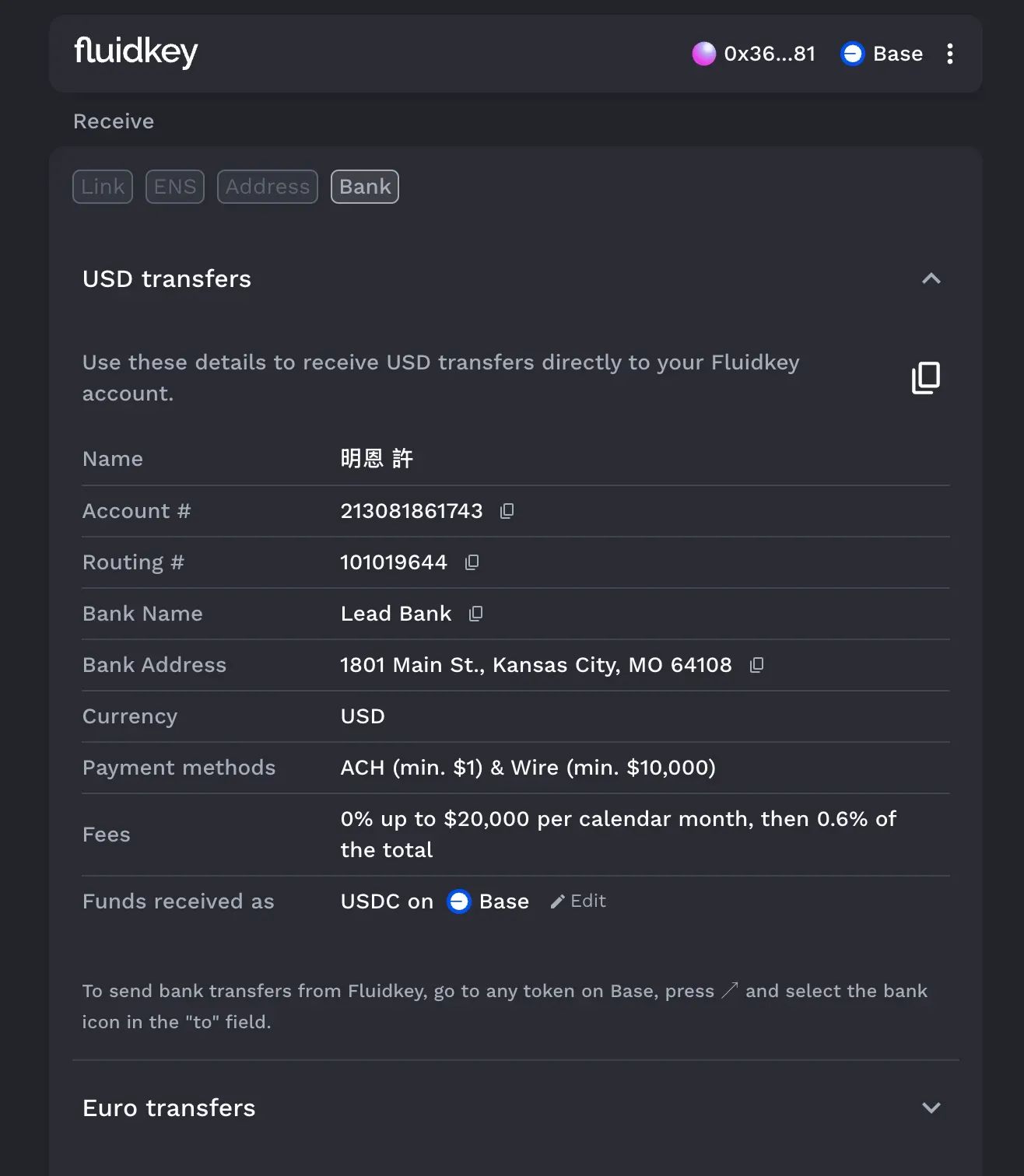
What's even better is that Fluidkey integrates an auto-yield feature. With user authorization, it automatically deploys assets scattered across different addresses to platforms like Aave and Morpho to earn yield. This means you can protect your privacy without sacrificing returns.
However, those new to Fluidkey often have two common questions:
- Since it creates addresses for me, is it a centralized service?
- Could it be misused by criminals and eventually sanctioned like a mixer?
Wearing a Mask vs. Taking a Back Alley
Fluidkey is a decentralized tool. It doesn't custody your assets; the funds in each address are still controlled by the user, and Fluidkey cannot move them. The concept behind this is called a "Stealth Address." The name sounds cool but can be misleading—it doesn't provide invisibility. Instead, it's more like "wearing a mask."
Imagine a blockchain explorer as surveillance cameras on a main street; every action on-chain is recorded. If you go out wearing a mask, hat, and sunglasses, the cameras can capture you, but it's hard to directly identify your true identity. It's only if law enforcement investigates further—where did you leave from? Where did you go?—that they might deduce who you are. Fluidkey offers this level of privacy protection.
For example, in the morning, I use Fluidkey to create a stealth address and receive a $100 payment for an article from a publisher. In the afternoon, I book a flight and pay directly with that money. The on-chain financial flow is clear: someone received money from a publisher and transferred it to a travel agency, but no one knows that person is me.
Unless public authorities intervene someday to ask the publisher and the travel agency, it would be difficult to trace who was in the middle. Fluidkey doesn't erase the financial trail; it simply prevents identity from being easily exposed. This is completely different from the purpose of a coin mixer.
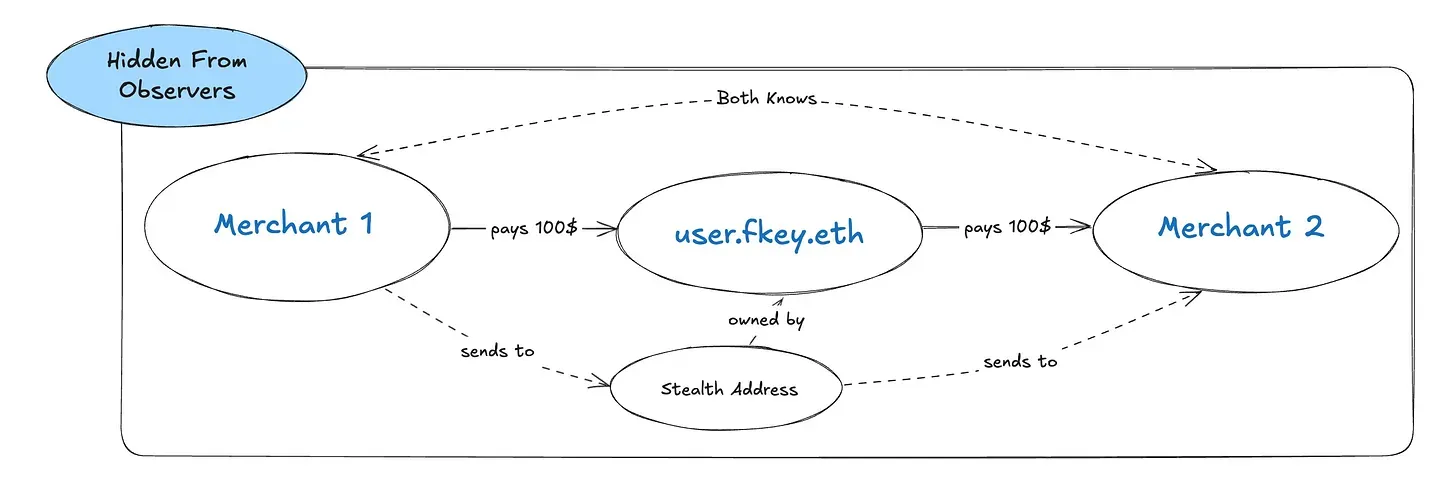
Coin mixers are like taking a back alley. A surveillance camera might catch someone on the main road, but once they turn into a small alley with no cameras, the footage stops. The person disappears, making it very difficult for investigators to continue tracking them. This is why mixers are easily abused by criminals.
The trickiest part, however, is using both together: a criminal in a baseball cap and sunglasses disappears into a back alley with no cameras. On-chain, this means transferring assets to a one-time address first, and then sending them through a mixer for anonymity. The flow of funds becomes layered, making it much harder to trace who transferred what to whom.
I deeply respect developers who build privacy tools in the crypto space, as they often face societal misunderstanding. Fluidkey is a tool designed for ordinary people like you and me, but hackers often learn to "wear masks and take back alleys" faster than the average person. As a result, privacy tools get labeled as risky. Governments and regulatory bodies often prefer a blanket ban on such tools, even knowing that it might be an overreach, with some arguing: "the benefits outweigh the drawbacks."
However, returning to the physical world, ordinary people also wear masks and take back alleys. The police won't interrogate you just because you prefer walking down alleys without surveillance, and wearing a mask is a perfectly normal behavior. Yet, in the digital world, governments often believe that by simply banning masks and blocking alleys, crime rates will decline. But is a low crime-solving rate truly caused by masks and back alleys?
Online shopping brings fraud risks. Perhaps banning online shopping could eradicate fraud. But a smart government would propose "logistics privacy mask technology," allowing for the best of both worlds.
p.s. This is the 697th article. Blocktrend plans to adjust its subscription rates to $10 per month and $100 per year after the 700th issue is published. The new rates will only affect new subscribers or members who cancel and then resubscribe. Existing subscribers' prices will remain unchanged.




